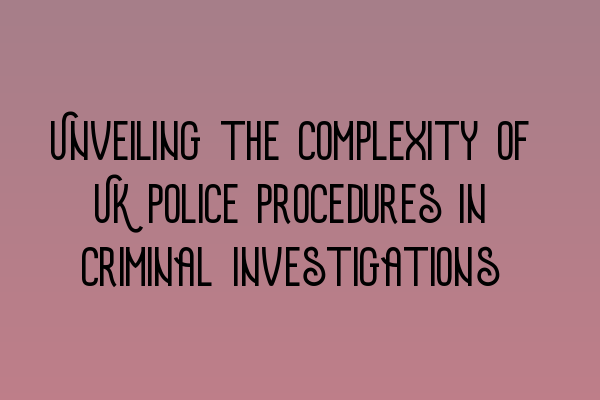Unveiling the Complexity of UK Police Procedures in Criminal Investigations
When facing criminal charges in the UK, it is crucial to understand the complexities of police procedures and investigations. The process can be overwhelming and confusing, especially for individuals who are not familiar with the legal system. In this article, we will shed light on the key aspects of UK police procedures in criminal investigations, providing you with a comprehensive overview of what to expect.
Before delving into the intricacies, it is important to note that professional legal guidance from experienced criminal law solicitors is essential to navigate through the complexities effectively. They have the knowledge and expertise to protect your rights and ensure a fair legal process.
Arrest and Detention
The first stage of a criminal investigation typically involves an arrest or detention. When the police have reasonable grounds to suspect that an individual has committed an offense, they can apprehend and detain the person for questioning. It is crucial to understand that you have the right to consult with a solicitor during this stage to protect your interests.
During the detention period, the police have the authority to conduct necessary searches and take your fingerprints, photographs, and DNA samples. These actions are part of the investigative process aimed at gathering evidence for potential use in court.
Interviews and Statements
Once you have been arrested or detained, the police will conduct interviews to gather information and evidence related to the alleged offense. These interviews can take place at a police station or other suitable locations.
As a suspect, you have the right to legal representation during these interviews. A solicitor can advise you on the best course of action and ensure your rights are protected throughout the process. It is crucial to provide accurate information and avoid making statements that may incriminate you.
If you are not fluent in English or have communication difficulties, the police must provide interpretation services to ensure effective communication during interviews.
Evidence Gathering and Preservation
The police have the responsibility to collect and preserve evidence during a criminal investigation. This evidence may include physical objects, documents, witness statements, CCTV footage, and forensic analysis. The gathering and preservation of evidence must adhere to strict legal guidelines to ensure its admissibility in court.
If you believe that any evidence has been mishandled or obtained unlawfully, it is crucial to inform your solicitor immediately. They will assess the situation and take appropriate action to protect your rights and challenge the admissibility of such evidence.
Bail and Court Proceedings
Following arrest and detention, the police must review your case to determine whether you can be released on bail or if you need to be held in custody. Bail conditions may be imposed to ensure your attendance at court and prevent any potential interference with the ongoing investigation.
If your case proceeds to court, your solicitor will prepare your defense strategy and represent you throughout the proceedings. They will analyze the evidence, cross-examine witnesses, and present arguments to challenge the prosecution’s case. The ultimate goal is to secure the best possible outcome for you.
Conclusion
Understanding the complexities of UK police procedures in criminal investigations is crucial when facing criminal charges. It is essential to seek professional legal assistance to ensure your rights are protected and navigate through the complexities of the legal system.
To enhance your understanding of the SQE exams and enhance your chances of success, we recommend exploring the following related articles:
